El Comienzo
Como habrán visto en el video de arriba, la historia de la familia Peña es digna de ser tomada en cuenta. Es un ejemplo de superación. Es una demostración de lo que puede lograr el ser humano cuando decide tomar el camino al éxito y de la superación personal.
As you have seen in the video above, the history of the Peña family is worth taking into account. It is an example of overcoming. It is a demonstration of what human beings can achieve when they decide to take the path to success and self-improvement.
Nuestra historia comienza a partir de un muchacho de 14 años, Hernando – “Ernie” – Peña, quien tuvo la visión de superarse y de vencer las adversidades que le impuso la vida. Nacido en un hogar de un agricultor padre de 9 hijos, en un pueblo perdidos en La Serranía de Perijá, en Venezuela, quien sufrió un terrible accidente automovilístico y lo perdió todo. Luego de recuperarse de sus heridas, logró generar una granja de más de cincuenta mil pollos, que el destino le arrebató debido a una epidemia avícola: ¡perdiéndolo todo nuevamente!
Our story begins with a 14-year-old boy, Hernando – “Ernie” – Peña, who had the vision of overcoming himself and overcoming the adversities that life imposed on him. Born in a home of a farmer father of 9 children, in a lost town in La Serranía de Perijá, in Venezuela, who suffered a terrible car accident and lost everything. After recovering from his injuries, he managed to generate a farm of more than fifty thousand chickens, which fate snatched from him due to a poultry epidemic: losing everything again!
Uno de sus hijos, “Ernie”, no se dio por vencido. Sumido en la mayor e inimaginable pobreza, comenzó a trabajar por su cuenta, vendiendo empanadas, trabajando en lo que pudo para lograr el dinero suficiente para llegar a Caracas, la capital de Venezuela, buscando la luz al final del túnel.
One of his sons, “Ernie,” didn’t give up. Submerged in the greatest and unimaginable poverty, he began to work on his own, selling empanadas, working what he could to get enough money to get to Caracas, the capital of Venezuela, looking for the light at the end of the tunnel.
Un día, con su propio dinero ahorrado, tomó un bus y se aventuró a la próspera ciudad de Caracas y allí comenzó su nueva vida: ¡sin conocer a nadie!
One day, with his own money saved, he took a bus and ventured to the prosperous city of Caracas where began his new life: without knowing anyone!
No fue por suerte que “Ernie” se abrió camino en un nuevo mundo. Él tenía la intuición necesaria como para saber cómo proceder. Era servicial, amable y se hizo amar, robándole el corazón a una familia pudiente que para la época estaba en la cúspide del poder político venezolano. Venezuela estaba en su mejor momento económico, pero ese auge no le llegaba a su pueblo natal de Machiques, en el estado Zulia, paradójicamente la zona más rica del país, región de una ancestral tribu conocida como los wayús, de la que él desciende.
It was not by chance that “Ernie” made his way into his new world. He had the intuition to know how to proceed. He was helpful, kind, and made himself loved, stealing the hearts of a wealthy family that at the time was on the cusp of Venezuelan political power. Venezuela was at its best economic moment, but that boom did not reach his hometown of Machiques, in the state of Zulia, paradoxically the richest area in the country, a region of an ancestral tribe known as the Wayús, from which he descends.
La Fundación
En 1972 me encontraba estudiando en Berlín Occidental, donde por un golpe del destino, entré en contacto con el Departamento de Estado de Estados Unidos. En 1973 regresé a Venezuela para montar mi propia empresa. Ahí conocí a Vianey – “Danny” – Torres, hermano de 13 años de uno de mis mejores empleados. Era un muchacho que merecía un mejor futuro.
In 1972 I was studying in West Berlin, whereby a stroke of fate, I came into contact with the United States Department of State. In 1973 I returned to Venezuela to start my own company. There I met Vianey – “Danny” – Torres, the 13-year-old brother of one of my best employees. He was a boy who deserved a better future.
.
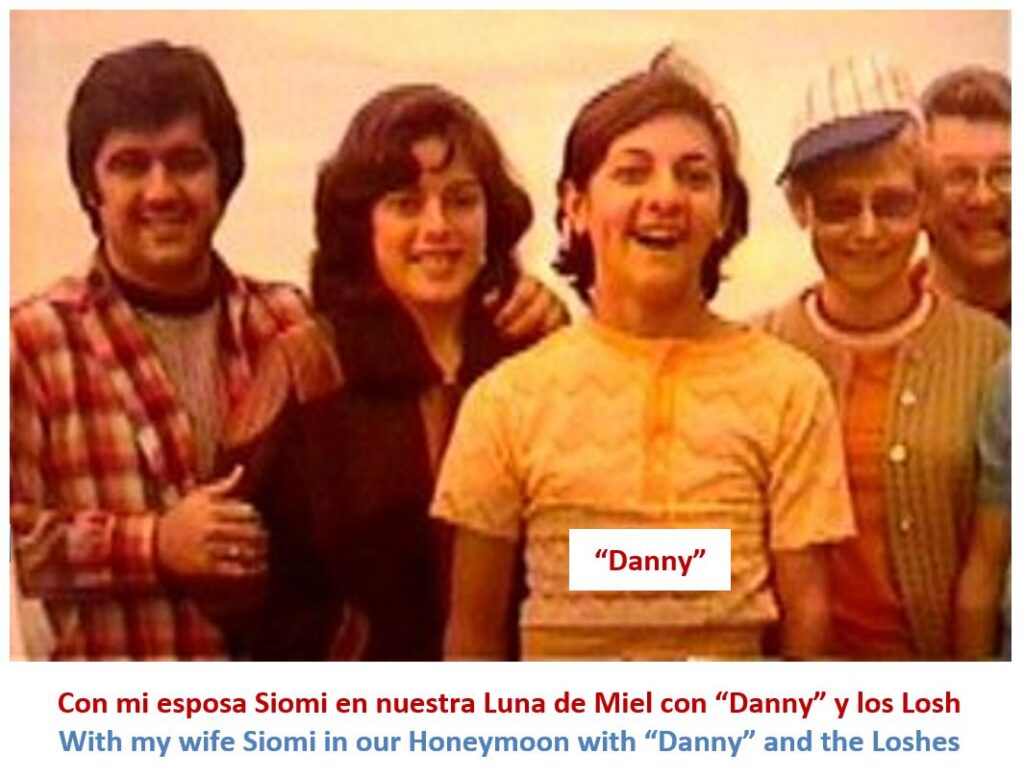
.
Había vivido con la familia Losh en Deer Park, un pequeño pueblo del estado de Washington. Mi hermana y una prima habían vivido con los Losh y se me ocurrió enviar a “Danny” para que viviera con ellos y estudiara en el “high school” del pueblo, que entonces contaba con unos tres mil habitantes.
I had lived with the Losh family in Deer Park, a small town in Washington state. My sister and a cousin had lived with the Loshes and it occurred to me to send “Danny” to live with them and study at the high school in town, which at the time had about three thousand inhabitants.
En una cena a la que fui invitado en la embajada de Estados Unidos en Caracas, le comenté al entonces-embajador sobre “Danny” y a éste le pareció que podría multiplicar mi esfuerzo enviando a muchachos venezolanos provenientes de familias de las clases más pobres de Venezuela para que vivieran en Estados Unidos, se educaran y conocieran la manera de vivir estadounidense con la intención que al regresar a nuestro país se convirtieran en “embajadores ad-honorem” de Estados Unidos de América.
At a dinner to which I was invited at the United States embassy in Caracas, I told the then-ambassador about “Danny” and he thought I could multiply my effort by sending Venezuelan boys from families of the poorest classes in Venezuela so that they would live in the United States, be educated and learn the American way of life with the intention that upon returning to our country they would become “ad-honorem ambassadors” for the United States of America.
Pasaron dos años y un día me invitaron a una reunión en Washington DC. La idea de quien había sido embajador de Estados Unidos en Venezuela caló entre el Departamento de Estado y ahí comenzó la “aventura”.
Two years went by and one day I was invited to a meeting in Washington DC. The idea of who had been the United States ambassador to Venezuela caught up with the State Department and there our “adventure” began.
.
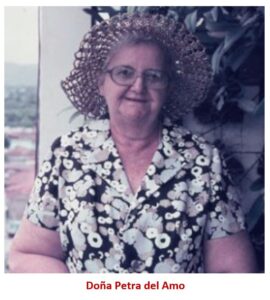
.
Basado en el mencionado proyecto, nació “La Fundación Doña Petra del Amo” en honor a mi abuela materna: Petra del Amo, un ser humano excepcional que le dedicó su vida a la atención de los muchachos más pobres de nuestra Cuba natal. Doña Petra murió en su exilio de Puerto Rico el 11 de enero de 1974, donde descansan sus restos mortales.
Based on the aforementioned project, “The Doña Petra del Amo Foundation” was born in honor of my maternal grandmother: Petra del Amo, an exceptional human being who dedicated her life to caring for the poorest children in our native Cuba. Doña Petra died in her exile in Puerto Rico on January 11, 1974, where her mortal remains rest.
.
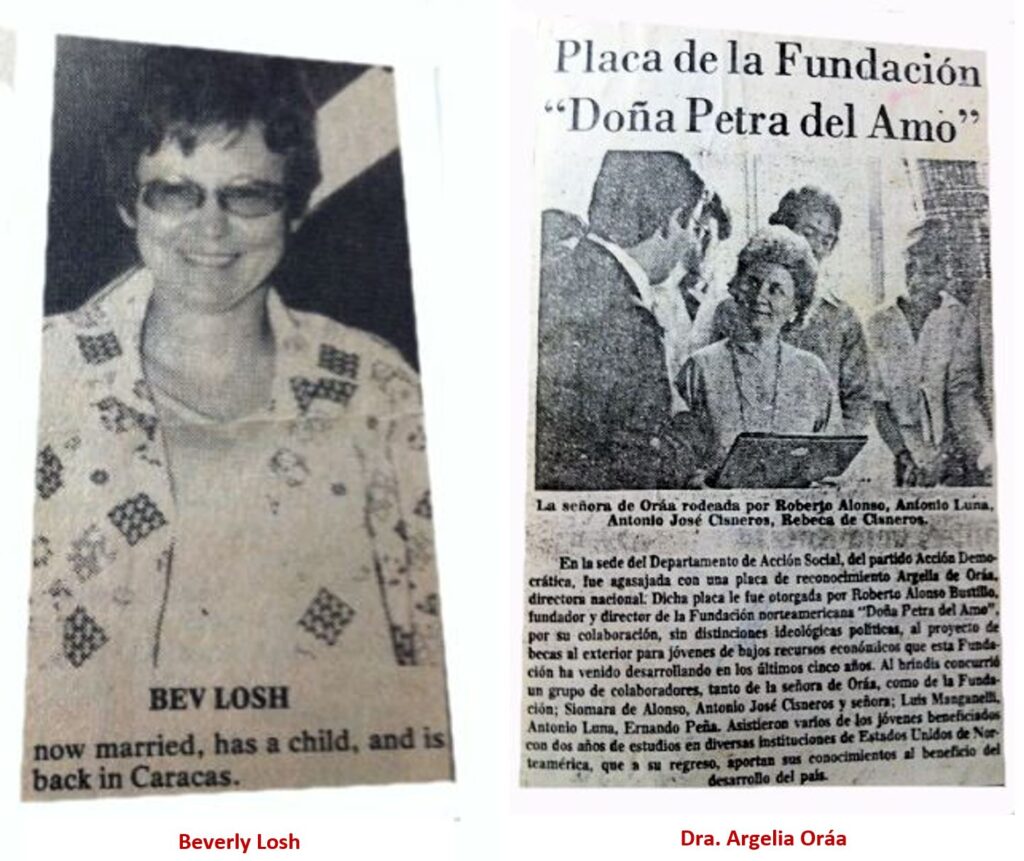
.
La administradora del programa en el estado de Washington fue Beverly Losh, mi “madre americana“. En Venezuela contamos con la importante ayuda de la Dra. Argelia de Oraá, una socióloga relacionada con el partido político que para 1975 gobernaba nuestro país.
The manager of the program in Washington State was Beverly Losh, my “American mother.” In Venezuela we had the important help of Dr. Argelia de Oraá, a sociologist related to the political party that governed our country in 1975.
El gobierno de Estados Unidos cubriría los pasajes aéreos de Venezuela a Deer Park (estado de Washington), donde mi “madre americana” se encargaría de conseguir familias dispuestas a recibir a estos jóvenes de ambos sexos. Las familias anfitrionas cubrirían los gastos de manutención y de vestimenta de los jóvenes del programa. Vivirían en hogares de agricultores y ayudarían en las tareas de las granjas, tal como lo hacían los hijos biológicos de cada familia, por lo que recibirían una mesada para cubrir sus gastos extras. Cada muchacho estaba cubierto por seguros de salud gestionados a través de la fundación.
The United States government would cover the air tickets from Venezuela to Deer Park (Washington state), where my “American mother” would be in charge of finding families willing to receive these young kids of both sexes. The host families would cover the living and clothing costs of the youth in the program. They would live in farmers’ homes and help with the farm’s tasks, as did the biological children of each family, for which they would receive an allowance to cover their extra expenses. Each boy was covered by health insurance managed through the foundation.
En un principio se consideró extender el programa a otros países de la América hispana, lo que no llegó a materializarse debido a complicados factores que no vienen al caso; sin embargo, la fundación se extendió a los estados de Montana, Idaho y Oregón.
At first, it was considered to extend the program to other countries of Hispanic America, which did not materialize due to complicated factors that are not relevant; however, the foundation spread to the states of Montana, Idaho, and Oregon.
El programa contemplaba mantener a los muchachos entre 15 y 16 años hasta que se graduaran de “high school”, considerando la posibilidad, de acuerdo a sus calificaciones académicas, de seguir estudios universitarios.
The program contemplated keeping the kids between 15 and 16 years old until they graduated from high school, considering the possibility, according to their academic qualifications, of pursuing university studies.
La mayoría de estos beneficiados regresó a Venezuela luego de graduarse de “high school” y unos cuantos siguieron estudios universitarios; sin embargo, al regresar a sus deprimidas comunidades en Venezuela comenzaron los problemas. Muchos de ellos no pudieron adaptarse a la vida que habían dejado años atrás, lo que motivó el debilitamiento del programa. Unos cuantos decidieron quedarse en Estados Unidos, donde lograron graduarse en diferentes universidades, entre ellos “Ernie”, quien se graduó de ingeniero mecánico y terminó trabajando en Spokane como mecánico industrial.
Most of these beneficiaries returned to Venezuela after graduating from high school and a few continued university studies; however, when they returned to their depressed communities in Venezuela, the problems began. Many of them could not adjust to the life they had left years ago, which led to the weakening of the program. A few decided to stay in the United States, where they managed to graduate from different universities, including “Ernie,” who graduated as a mechanical engineer and ended up working in Spokane as an industrial mechanic.
.
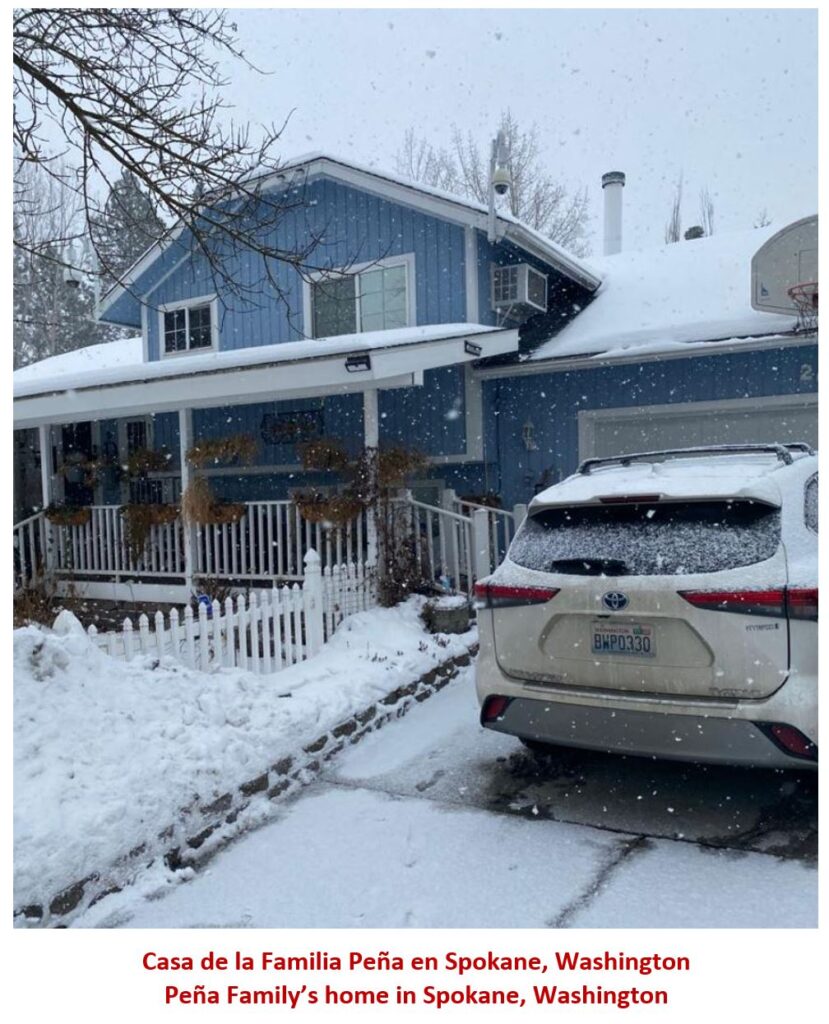
.
La Familia Peña
.
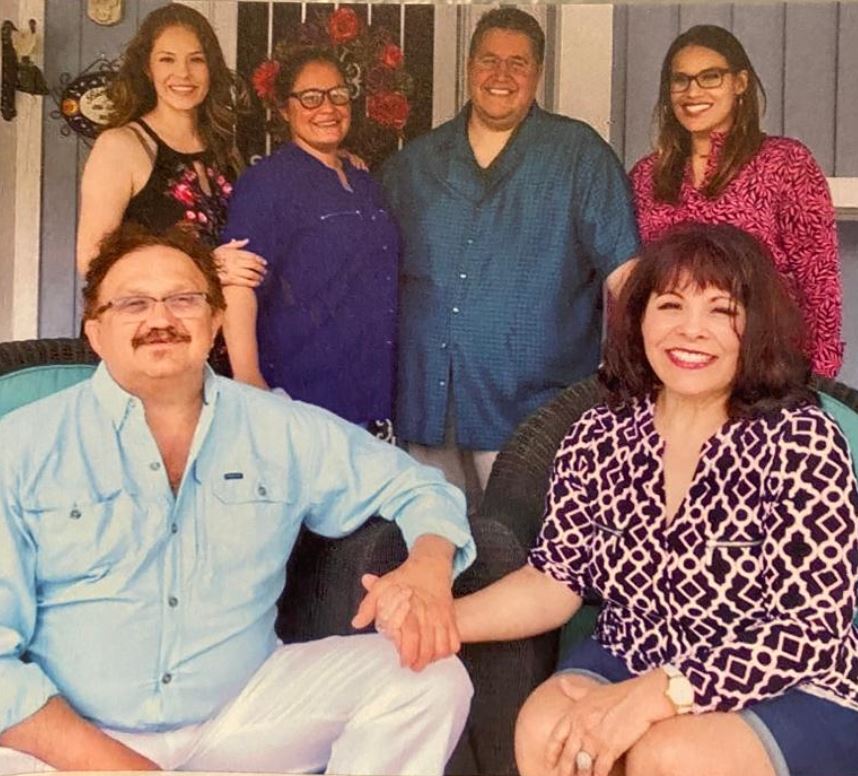
.
Hernando Jesús Peña Corona, nacido en Machiques (Venezuela) el 17 de junio de 1958, se casó con Pamela Jeanette Alvarado, quien estudió enfermería y administración comercial en Kinman Business University, había nacido en el estado de Nuevo México y de ascendencia mexicana, el 7 de abril de 1961. La boda se realizó en Deer Park el 12 de octubre de 1979: “Ernie“, de 21 años y Pamela de 18. A la fecha de esta publicación, llevan 42 años felizmente unidos en matrimonio.
Hernando Jesús Peña Corona, born in Machiques (Venezuela) on June 17, 1958, married Pamela Jeanette Alvarado, who studied nursing and business administration at Kinman Business University, and had been born in the state of New Mexico and of Mexican descent in April 7, 1961. The wedding took place in Deer Park on October 12, 1979: “Ernie” 21, and Pamela, 18. As of the date of this publication, they have been happily married for 42 years.
.
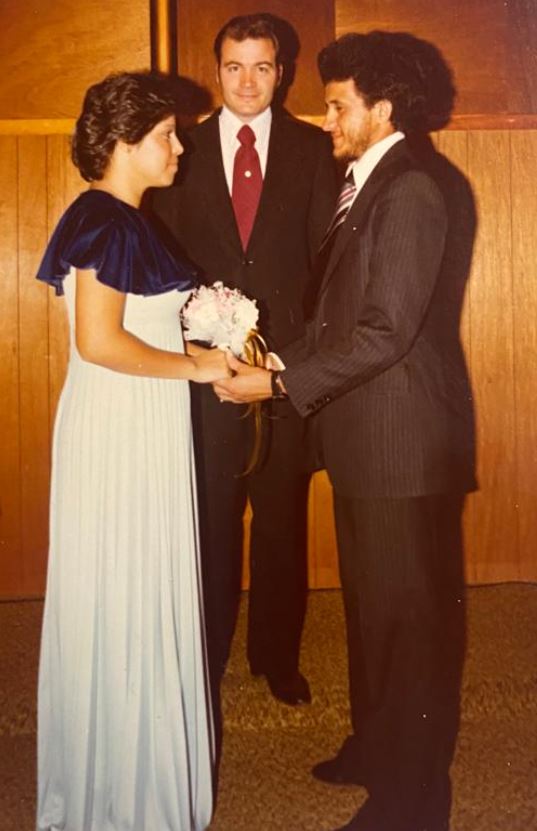
.
De la sagrada unión de “Ernie” y Pamela, nacieron un hijo y tres hijas.
From the sacred union of “Ernie” and Pamela, a son and three daughters were born.
Jeffrey Eugene Peña es el hijo mayor. Él y su esposa tienen cinco hijos. Actualmente es el Director Senior de Ventas, Marketing y Servicio al Cliente para un negocio de fabricación esencial en Spokane Washington. Jeff también es dueño de dos pequeñas empresas. Grace Marie Peña Bach es graduada de la Universidad Estatal de Washington. Se especializó en Broadcast Communications y es una ex presentadora meteorológica local para KREM TV en Spokane Washington. Ella y su esposo tienen dos hijos pequeños y dirigen un pequeño negocio de iluminación comercial. Grace es una ama de casa y trabaja desde su hogar como productora de video independiente, escritora y consultora de comunicaciones. Jocelynn Lisleida Peña es la orgullosa madre de cinco hijos y es ama de casa. También trabaja en la industria de servicios de alimentos a tiempo parcial. Y luego está el bebé de la familia, Julianna Nicole Peña. Julianna ha dedicado los últimos 14 años de su vida a las artes marciales mixtas. Ella pelea profesionalmente para el UFC, y en diciembre de 2021 se coronó campeona mundial femenina de peso gallo. Ella sorprendió al mundo al derrotar a Amanda “La Leona” Nunes. Julianna también es mamá de Isabella.
Jeffrey Eugene Peña is the eldest child. He and his wife have five boys. He is currently the Senior Director of Sales, Marketing, and Customer Service for an essential manufacturing business in Spokane Washington. Jeff also owns two small businesses. Grace Marie Peña Bach is a graduate of Washington State University. She majored in Broadcast Communications and is a former local weather anchor for KREM TV in Spokane Washington. She and her husband have two young sons and run a small business doing commercial lighting. Grace is a stay-at-home mom, and works from home as a freelance video producer, writer, and communications consultant. Jocelynn Lisleida Peña is the proud mother of five children and is a stay-at-home mom. She also works in the food service industry part time. And then there is the baby of the family, Julianna Nicole Peña. Julianna has dedicated the last 14 years of her life to mixed martial arts. She fights professionally for the UFC, and in December 2021, was crowned the women’s bantamweight champion. She shocked the world by defeating Amanda “The Lioness” Nunes. Julianna is also mama to Isabella.
.
La.
La pelea Nunes-Peña fue una sorpresa mundial y generó cualquier cantidad de comentarios favorables y en contra. Los aficionados a este duro y rudo deporte no podían creer que la super-campeona mundial fuese derrotada por “La Zorra Venezolana“, como los medios deportivos le llaman a Julianna. Sin duda que vendrá la revancha.
The Nunes-Peña fight was a worldwide surprise and generated any number of favorable and converse comments. The fans of this tough and rough sport could not believe that the world super-champion was defeated by “The Venezuelan Vixen“, as the sports media calls Julianna. No doubt the rematch will come.
.
.
Album de Fotos
.

.

.
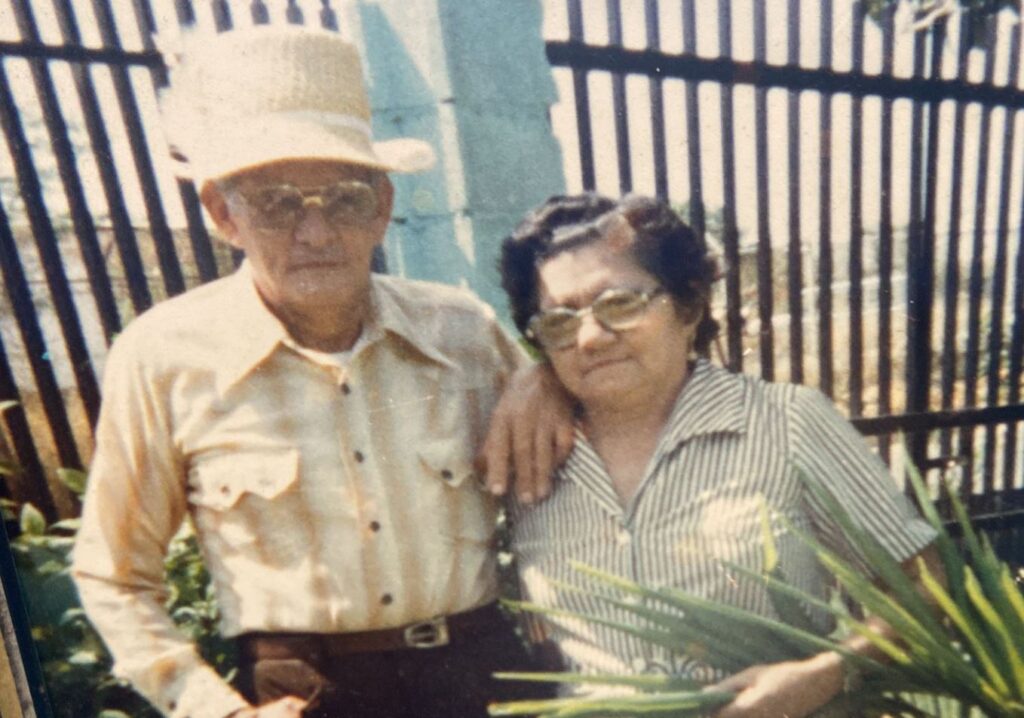
.
Padres de “Ernie” Peña – Eugenio Peña y Graciela Corona
“Ernie” Peña’s parents – Eugenio Peña and Graciela Corona
.

.

.

.

.
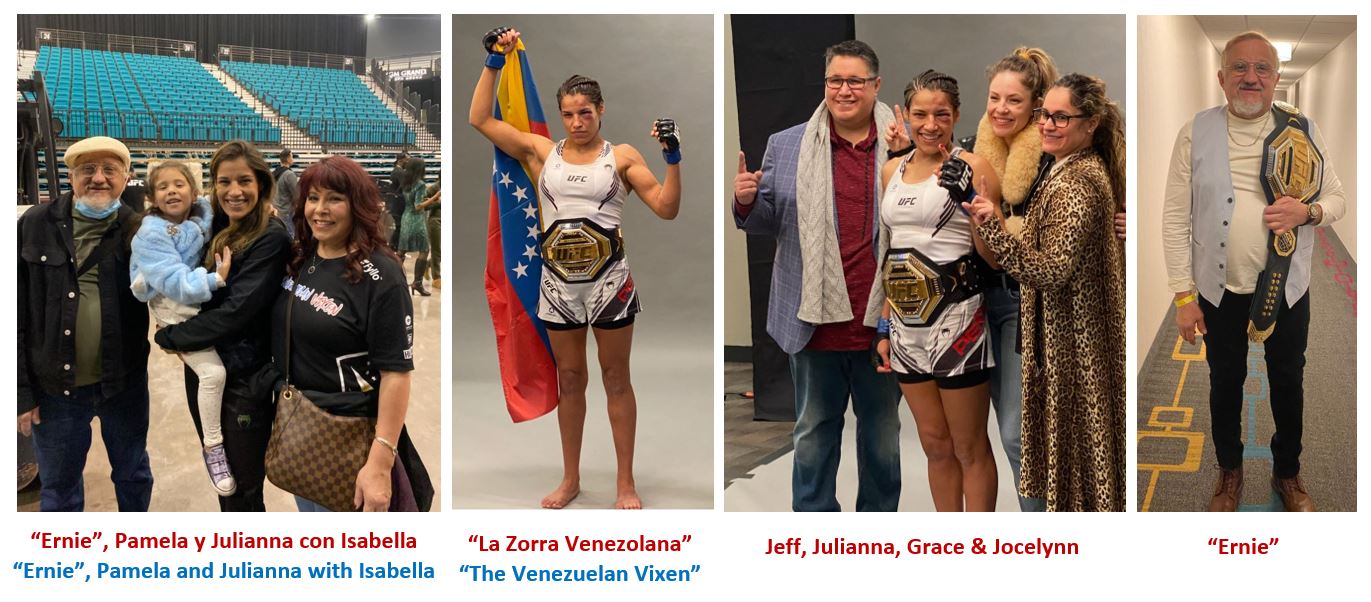
.
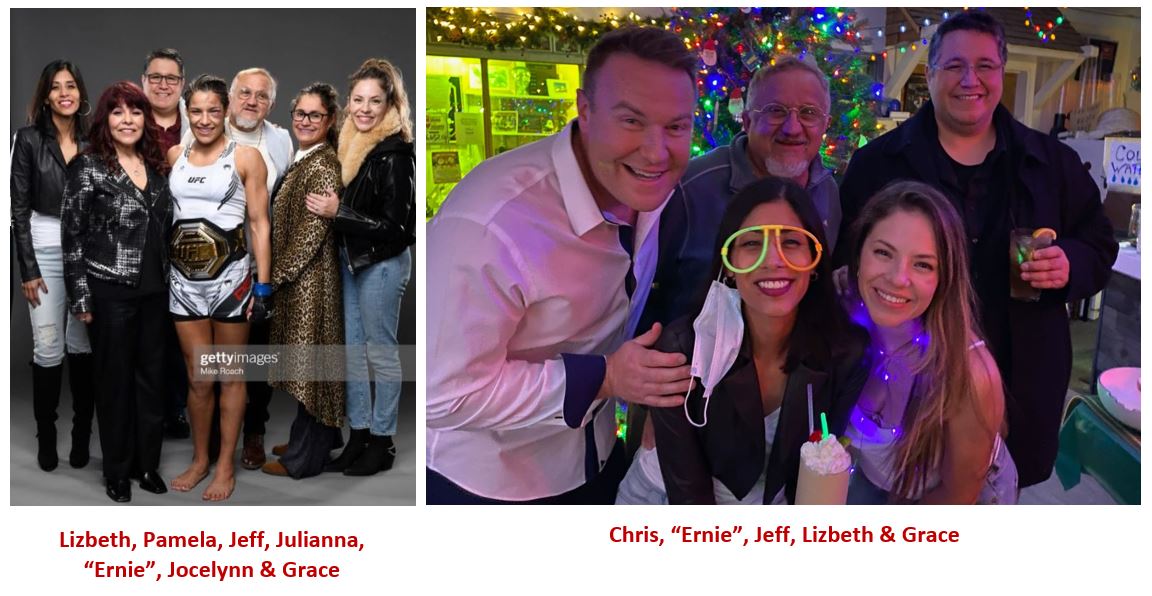
.
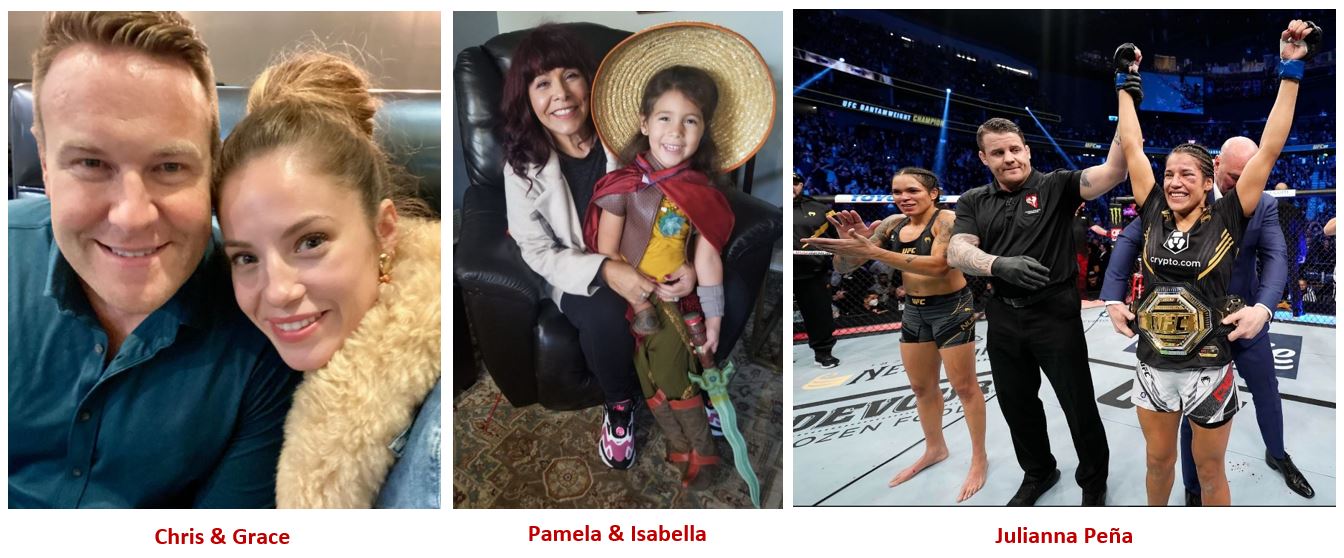
.
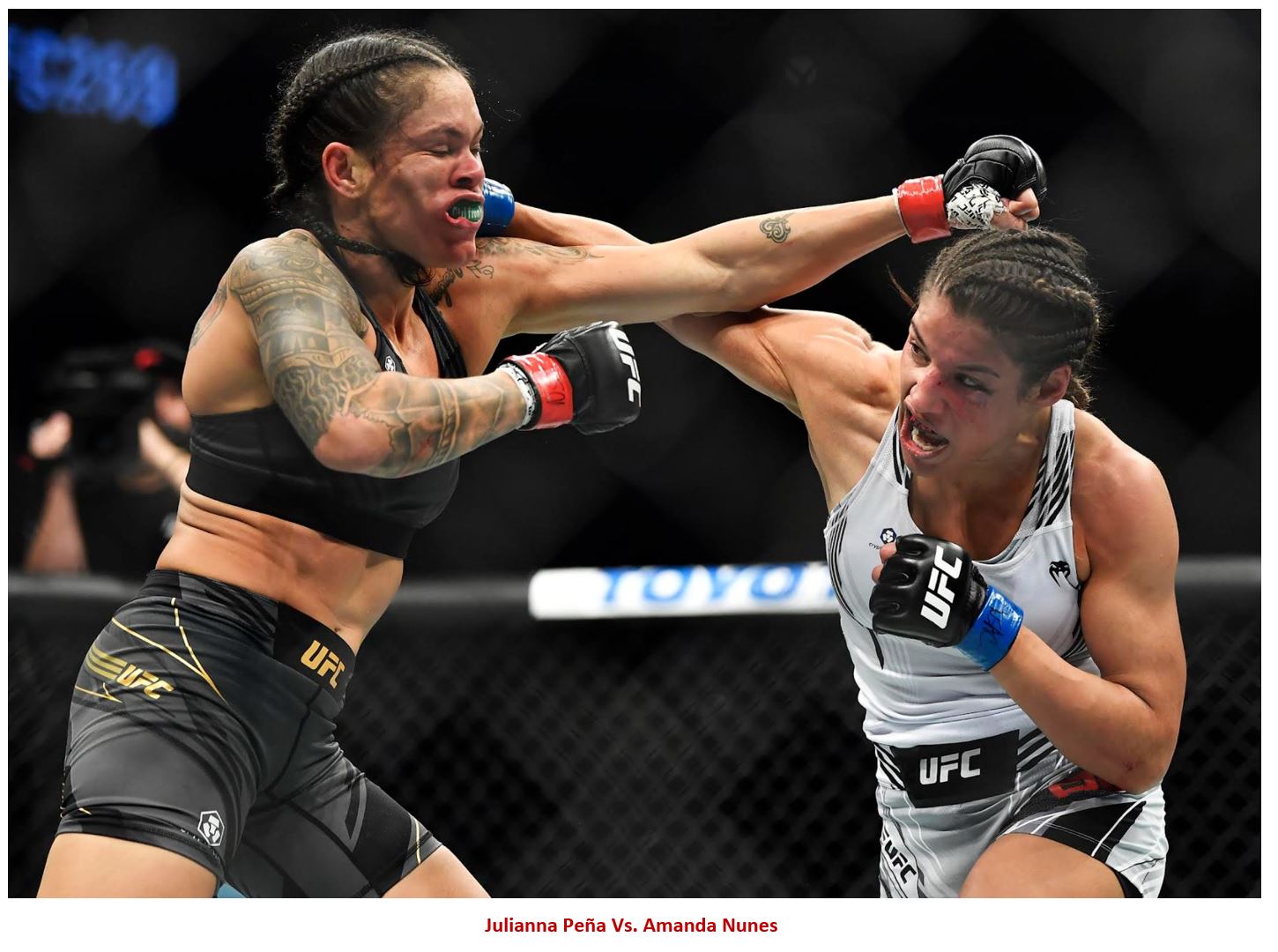
.
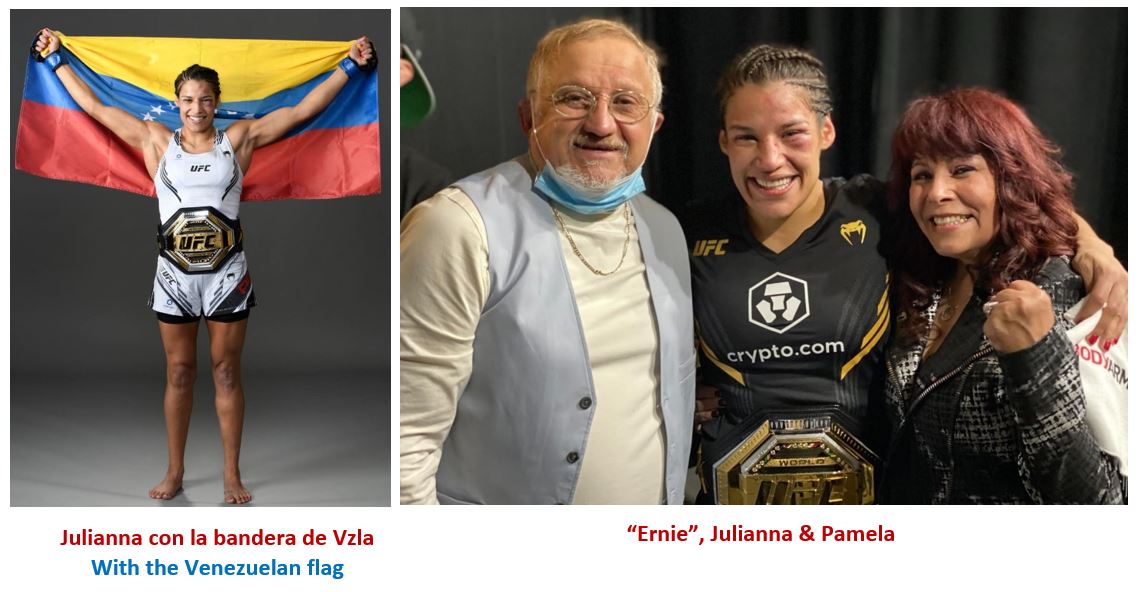
.

.

.
Miami 6 de enero de 2022
Miami January 6, 2022
Robert Alonso
@Maestro_May9r


